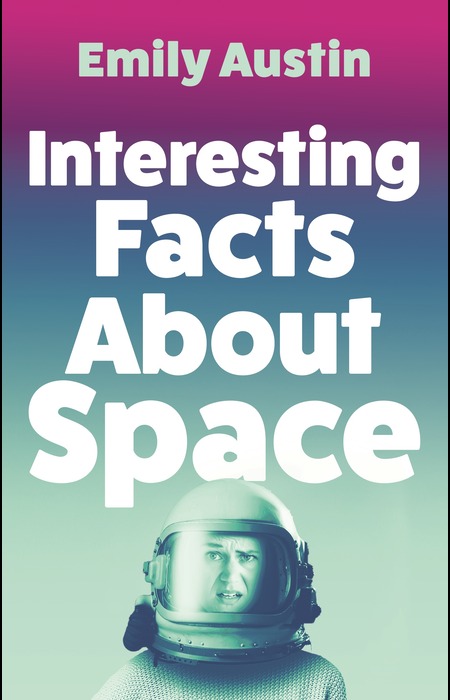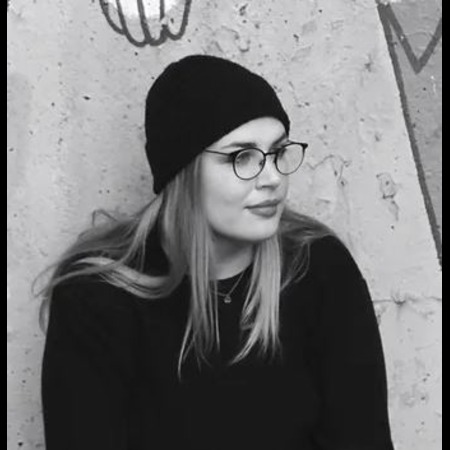(courtesy Allen & Unwin)
No one wants to think they’re a terrible person.
If we’re honest, we all want to be the hero, the saviour, the flawlessly giving and selfless person that people laud and talk about with breathless wonder, someone people want to be friends with and love and belong to and with.
That’s the life goal but many of us end up, for a variety of reasons thinking there is something deeply wrong with us; that all of the lofty, vaulting dreams of existential stardom and fandom we hold for ourselves are just a shimmering mirage somewhere out in the journey of life.
Enid, the protagonist of Interesting Facts About Space by Emily Austin – the title comes from the tendency a very anxious Enid has, when she feels awkward or emotionally uncomfortable, to spout random facts about space – certainly feels that way, convinced a parasite of some kind is living inside her, driving her to think some truly dire things that simply don’t square with the person she wants to be.
It troubles her deeply because Enid really wants to be a good, kind and wonderful person – she is that person far more than she knows but consumed by anxiety and a mounting sense she’s some sort of existential impostor, she often fails to see it, crucifying herself for evert slip-up or odd moment – but she feels like she fails far more than she wants to and she can’t see how to fix it.
I turn the volume of my podcast up. I need to drown out my thoughts. When I’m spiraling, it helps to listen to my murder stories. I think they might be an outlet for my parasite. Rather than actually unleash any anger, and risk ruining Eugene’s dinner, I feed the evil bug in my heart depraved stories. I distract myself and soothe him in a little bath of horrors until my anger simmers and my molars unclench.
But then, as Interesting Facts About Space asks over and over, does Enid really need fixing?
She’s idiosyncratic yes, a deaf-in-one-ear lesbian who spends her days listening to gory true crime podcasts and who’s crippled by a fear of bald men that has real life implications for her at work where she’s an analyst at a space agency.
But is she broken? Not really; in fact, she feels very warm and human, fallible and flawed in the way that many of us are, and while she does get things wrong, including how to navigate and build a strange-but-possible new relationship, she’s no worse or better than many of us.
Still, trying telling hyper-critical Enid that, a woman who is desperately and exhaustingly self-aware, and whose internal battle with a thousand carping demons has to jostle for mental and emotional space with a growing sense that she’s being stalked and that someone is actually out to get her.
It’s a terrible feeling and it drags her down just as she wants to rise up, like we all do, and help her mum to deal with her lingering mental health issues, get to know her half-sisters better and figure out if her mortifying embarrassment about the angsty videos she uploaded to YouTube during her teenage years are really as bad as she thinks. (She wants to delete them but has lost the password so she resorts to reporting them for a range of spurious and charmingly amusing but emotionally intense reasons.)
(courtesy official author site)
What really grips you about Interesting Facts About Space, quite apart from the fact that Enid is accessibly wonderful human and the sort of person you can readily identify with, is how richly and meaningfully Austin explores what it is like to wrestle with anxiety and depression.
But particularly anxiety which is rife in Enid’s life and which inflates, as the irrational condition is wont to do, innocuous events into cataclysmically awful mountains of worry and consuming hellholes of doubt and sadness.
If you have ever lived with anxiety, you, like this reviewer, will find much that resonates with you, and while Austin is honest about how it can affect you and weigh down your life and negatively colour self-perception, she also paints a hopeful picture about how you can live beyond it too.
One thing that’s always closely coupled with an anxious state of mind is being fearful of what others think about you; suffice to say that no matter how good and wondrously lovely you might be, anxiety will have you thinking you are an ogre whose every move and utterance is a thing of abject horror to everyone around you.
Enid is convinced this is the case with her and while she has her fair share of awkward moments – many driven by a neurodivergency that isn’t officially diagnosed until later in the book – she is no better or worse that those with whom she is in constant contact.
She’s odd at times, yes, but who of us aren’t in our own ways?
What am I supposed to do?
The room is quiet. Polly turned the podcast off.
‘I think I need to go to therapy,’ I say.
She agrees. ‘Yeah, you do.’
What anxiety takes from you a lot of the time, and this is true for Enid, is that cosy sense that you are loved and value, no matter your weirdnesses and idiosyncrasies, and much of the sweet and charmingly funny Interesting Facts About Space concerns itself with what happens when you are truly, finally yourself with everyone around you.
Or, more tellingly, when you accept that your friends and family love and embrace your eccentricities and oddities as an intrinsic part of the totality of you, and that they’ll keep loving and accepting you even when all the secret stuff you tell no one emerges into the cold and clammy light of day.
Connecting truly, really and honestly with others is scary and terrifying, and for Enid complicated by the fact that reading of social cues and responding to them doesn’t come naturally to her, but Interesting Facts About Space makes it comfortingly clear that how we see the world when we’re wrapped in a ceaseless and ever-hovering cloud of anxiety is often not even close to how the world see and LIKES us.
When it dawns gradually on Enid through a variety of means and moments that this might be the case, Interesting Facts About Space comes into its own, reassuring Enid, and us, that while being close to other people can be terrifyingly intimidating at times, that it comes with all kinds of rewards and joys too, especially when we own ourselves, stand up for ourselves and realise that, warts and all, this is who we are and that, for the most part, we are loved and cherished just as we are.

